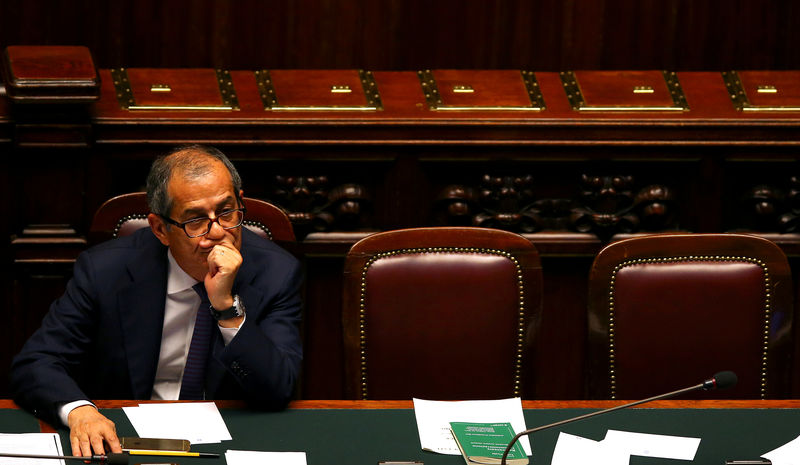 © Reuters. FILE PHOTO: Italian Economy Minister Giovanni Tria attends during his first session at the Lower House of the Parliament in Rome
© Reuters. FILE PHOTO: Italian Economy Minister Giovanni Tria attends during his first session at the Lower House of the Parliament in RomeBy Steve Scherer and Giuseppe Fonte
ROME (Reuters) – Italy’s populist ruling coalition called on Economy Minister Giovanni Tria on Wednesday to allow greater deficit spending in next year’s budget in order to make good on campaign promises, causing jitters in financial markets worried about debt.
Pressure on Tria has increased as a Sept. 27 deadline approaches to set the deficit and debt targets for next year’s budget, which must be presented to parliament by Oct. 20.
Italy’s public debt is the highest in the euro zone after Greece’s, and markets are concerned about the prospect of it rising further. Tria is seen as the bastion of market discipline against the demands of the ruling anti-establishment 5-Star Movement and far-right League party, which took office in June.
“We can’t wait two or three years to maintain our promises,” Luigi Di Maio, deputy prime minister and 5-Star leader, said on Wednesday during a trip to China, after repeating he had “full confidence” in Tria.
“The objective is not to reassure markets. The objective of the budget is to improve the quality of life of Italians,” Di Maio said.
The comments, although in line with Di Maio’s previous rhetoric, pushed up the yield on Italy’s 10-year bond because of concern that party leaders were leaning harder on Tria as the deadline looms to release the budget targets.
Giancarlo Giorgetti, a cabinet undersecretary and high-ranking League official, said in an interview with la Repubblica newspaper: “We only ask that Minister Tria not get hung up on decimal points, that he show a minimum of flexibility.”
THE SPREAD
Tria wants to keep the 2019 budget deficit at 1.6 percent of gross domestic product, according to a government source, while sources from 5-Star and the League have told Reuters they want it as high as 2.5 percent and not below 2 percent.
The sources said both parties were asking for nine billion euros each to enable them to start implementing their very different economic programs. They also want Tria to find 12.4 billion euros to avoid an automatic increase in sales taxes.
The 5-Star is determined to introduce a basic income for the poor — the cornerstone of its electoral manifesto — while the League wants to cut taxes and offer incentives to firms to plough their profits back into their businesses.
“A serious government will find the funds to fulfil its promises,” Di Maio said in China.
This year’s deficit goal is 1.6 percent and the target for 2019 set by the previous center-left administration is 0.8 percent. However, Tria — an academic who is not affiliated with either ruling party — has already said this will be raised significantly, partly because the economy is slowing.
“I’m tired of having to stick to parameters set by others,” League leader Matteo Salvini said on Tuesday during on a late-evening TV talk show, referring to public finance targets agreed between the previous government and the European Commission.
Speaking of the gap, or spread, between Italy’s 10-year bond yield and that of the safer German counterpart, Salvini said: “I’ll take care of the spread. I eat bread and spread, and I’ll keep it low.”
The spread was at 233 basis points on Wednesday, sharply down from peaks around 300 in May and June. However, it is still about 100 points higher than in early May before the ruling parties began negotiating their government “contract”.
Salvini said he did not believe the spread depended on the deficit target, but on the credibility of the government’s policies and their ability to boost growth.
Source: Investing.com




























